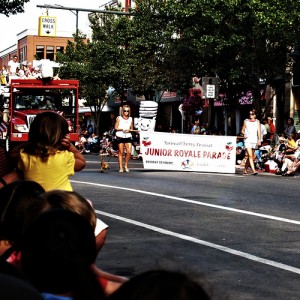Tom Nondorf limited his customers to two pounds of morels each.

The elusive morel mushroom popped early this year. Photo: Mark Kaye
But he still ran out of the local delicacy some 24 hours into this year’s Morel Mushroom Festival in Muscoda, Wis.
The reason: The record-breaking spring temperatures in the Great Lakes region are long gone, but their effects linger for area festivals celebrating things that grow.
Flowers, fruit trees, blossoms and mushrooms came early because March was almost 14 degrees above normal. And Nondorf had run low on fresh mushrooms by the time the festival rolled around.
Impacts on other regional festivals:
- The Tulip Time Festival in Holland, Mich. showcased stems rather than blossoms.
- The National Cherry Festival in Traverse City, Mich. will ship in cherries from other states for its festival in July.
- The Winona Peach Festival in Ontario is still going ahead — even though provincial farmers expect 30 percent fewer peaches.
The heat wave stemmed from unusual jet stream patterns and isn’t expected to become the new norm for the Great Lakes region, said Jeff Andresen, Michigan’s state climatologist and a professor of geography at Michigan State University. But the area’s climate is slowly changing.
The spring warm-up is 7-10 days earlier than it used to be, Andresen said. The problem is that the date of the last freeze isn’t moving ahead as quickly as the date when the warm-up starts.
That means plants get an early start but then are nailed by a freeze.
Tulips and morels came and went before festivals honoring them were scheduled. Cherry and peach blossoms withered in an April freeze.
Festival organizers are coping with the loss.
Warm weather popped mushrooms a month early, said Nondorf, a veteran who sells morels for the local American Legion.
When the festival rolled around, he had no fresh mushrooms to replenish his supply.
Even though there were other things to do at the weekend-long festival, attendance was down by Saturday night because people heard there weren’t any more mushrooms for sale.
Festivals are an economic boon to local communities. Attendance matters. Tulip Time brings $10 million into Holland, reported The Holland Sentinel.

The Stem Fest 2012 shirt Photo: Tulip Time Festival
Tulip Time organizers confronted the lack of tulips head on.
They ran a media campaign with the Holland Convention & Visitors Bureau encouraging people to come in April for tulips and in May for the festival which they renamed Stem Fest 2012.
It looks like it worked.
Hotel occupancy during the festival dipped 7 percent in Holland, but rose 9 percent in April over last year, said Sally Laukitis, the executive director of the Holland Convention & Visitors Bureau. Merchants and restaurant owners reported good Aprils.
“It’s not the first year tulips came early, but this is the first year Tulip Time made the best of the situation,” Laukitis said. “People liked the transparency.”
Inviting tourists early isn’t an option for festivals honoring fruit crops devastated by April frosts.
Michigan lost 80 percent of its sweet cherry crop and 90 percent of its tart cherries.
“The message coming from farmers and the industry is to stay positive and keep on the bright side,” said Trevor Tkach, executive director of the National Cherry Festival in Traverse City, Mich.
Stands at the festival slated for July 7-14 will still sell fresh fruit and

The National Cherry Festival in Traverse City, Mich Photo: Andrew McFarlane (flickr)
cherry-based products like jam and salsa. It’s just that cherries will come from western states where the crop survived.
Frost in 2010 made it a hard year for northwestern Michigan cherries as well, but Tkach remains upbeat about the crop.
The long-term climate has been ripe for cherries in Michigan; we have no concerns about climate change, he said.
Farmers lack long-term data on historical trends in fruit-producing areas in the Great Lakes, Andresen said. He’s running two studies that he hopes will help.
One follows cherries, the other corn and soybeans.
Ontario lost 30 percent of its peach crop, but organizers of the Winona Peach Festival aren’t worried.
It may be called a peach festival, but the celebration isn’t organized around peaches, Linda Shuker, the festival president, wrote in an email.
Yes it is nice and certainly wonderful if they are there, but the festival consists of many more things, she said.
